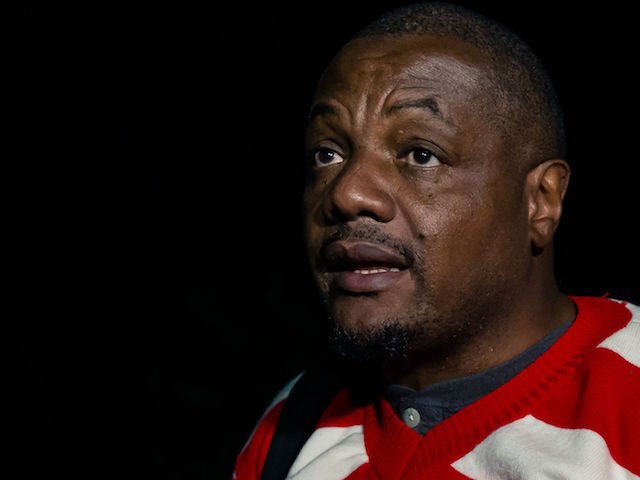Award-winning journalist Hopewell Chin’ono, recently released on bail from prison after authorities in socialist Zimbabwe imprisoned him for supporting protests, vowed he would tell the story of the abuses he endured behind bars as soon as possible in remarks on Tuesday.
Zimbabwean police arrested Chin’ono and opposition leader Jacob Ngarivhume were arrested on July 20 for publishing statements on social media urging attendance at a planned peaceful protest that week. While the current regime of President Emmerson Mnangagwa is in power in part due to widespread protests against predecessor and fellow socialist Robert Mugabe, it has aggressively cracked down on any vocal opposition, particularly those accusing the government of corruption.
Prior to his arrest, Chin’ono had revealed widespread state theft of public money meant to fund the fight against Chinese coronavirus. Chin’ono published images of health workers using bedsheets instead of formal personal protective equipment (PPE), demanding to know where the millions meant for them went.
Police have since arrested Zimbabwe’s health minister, Obadiah Moyo, on charges of corruption involving a $60 million contract for coronavirus supplies; he resigned after his arrest. Moyo’s bail was five times lower than Chin’ono’s.
Chin’ono told reporters upon his release that he left prison with some symptoms of coronavirus, including a fever. Reports surfacing when he was still inside suggested he was deprived food and health care and kept in leg shackles.
“I had a fever for the past three days but I am feeling much better. But mentally, I am fine,” Chin’ono told reporters gathered to meet him upon his dismissal from jail on Tuesday night. “I was convinced that I was arrested for exposing corruption and the president’s office ordered my arrest. When we go to trial, we shall prove that.”
Asked about how he would practice journalism given his ban from Twitter at the behest of the government of Zimbabwe, Chin’ono vowed to return on Facebook, and said he would detail his ordeal in prison in full. The court explicitly banned Chin’ono from using social media as a requirement of his bail, something the journalist did not seem concerned by.
“They disable you. The reason why I was put inside there was because I was, with a lot of journalists including you guys, we were putting out information exposing corruption, so removing us from Twitter — they removed me from Twitter, but not from Facebook, so I will continue to write on Facebook … and local media,” Chin’ono said.
In addition to his social media ban, the court forced Chin’ono to hand over the title to his house.
Chin’ono described his imprisonment as a tremendous error. In remarks published on Twitter by journalist Takunda Mandura, Chin’ono said, “If these guys knew the mistake they made by taking us in there, because we have seen things that we only used to hear about and we were not sure about but now we know. And we can write authoritatively about those things.”
He compared his prison to a “concentration camp” and decried the lack of safeguards against the Chinese coronavirus.
“People are living like they are in a concentration camp. They have no masks. The majority of the people, they don’t have masks. People don’t have soap and their relatives are not allowed to come because of COVID [Chinese coronavirus] restrictions that have been put in place by prison authorities,” Chin’ono testified. “They have no soap, the diet is just sadza, barely cooked sadza with beans or cabbages. So the life is really horrible and there’s no social distancing.”
Sadza is a Zimbabwean porridge.
Chin’ono also said that he saw, rather than social distancing, inappropriate crowding in prison cells. Some cells, he said, designed for 16 people had as many as 44 living inside.
“It’s a total mess. And what I saw inside there validates the exposures that I was making. That money is being stolen by this government, money that is meant to look after people like prisoners, hospitals … the hospital there had nothing, they couldn’t even check my blood pressure,” he affirmed.
Jacob Ngarivhume similarly said that he endured harsh conditions in the prison, but credited the prisoners that he found himself serving with for treating him well, despite noting that half his cell “was serving life sentences,” some for violent crimes.
“There is no going back, there is no turning back, absolutely, our resolve is unshakable,” Ngarivhume said.

COMMENTS
Please let us know if you're having issues with commenting.